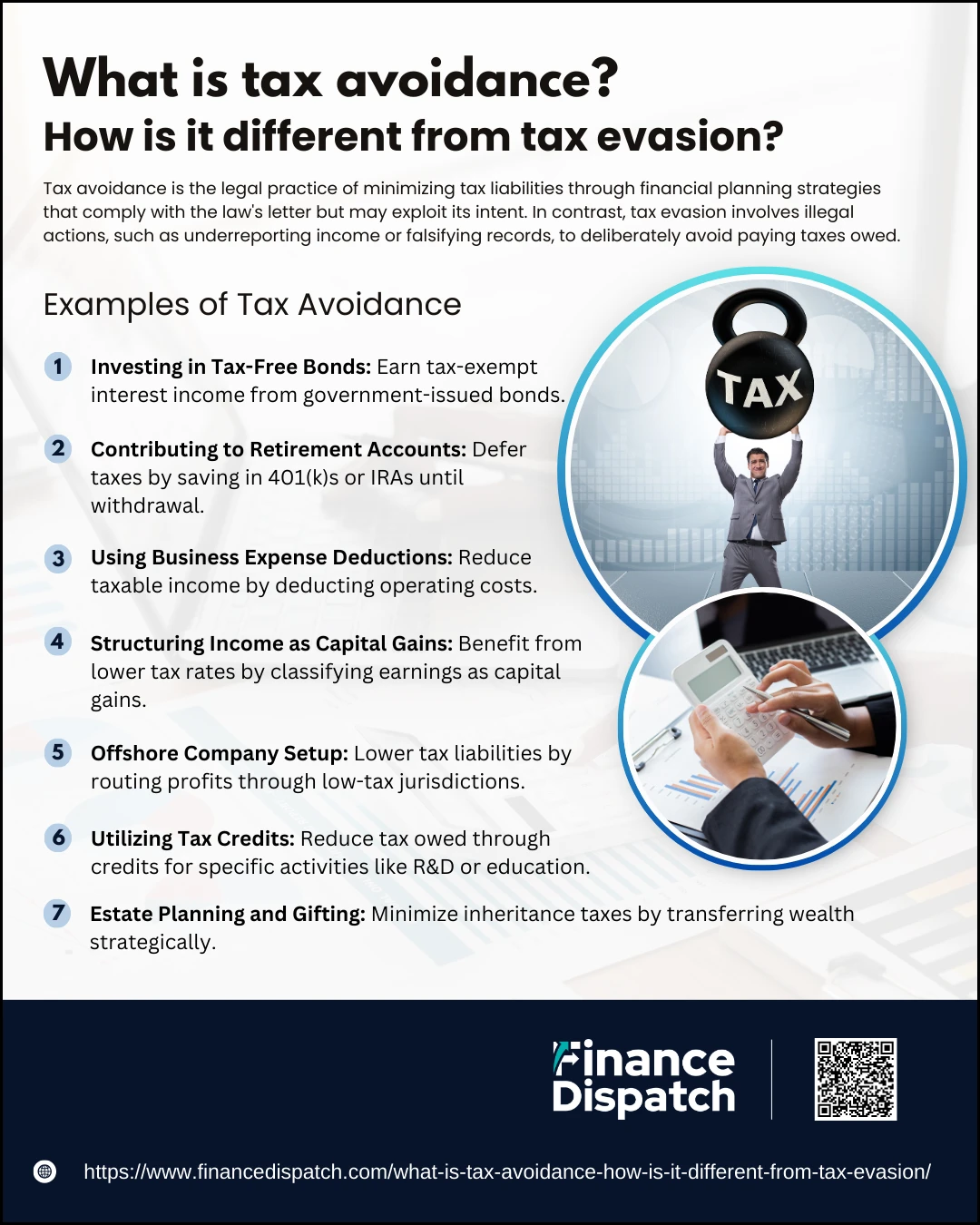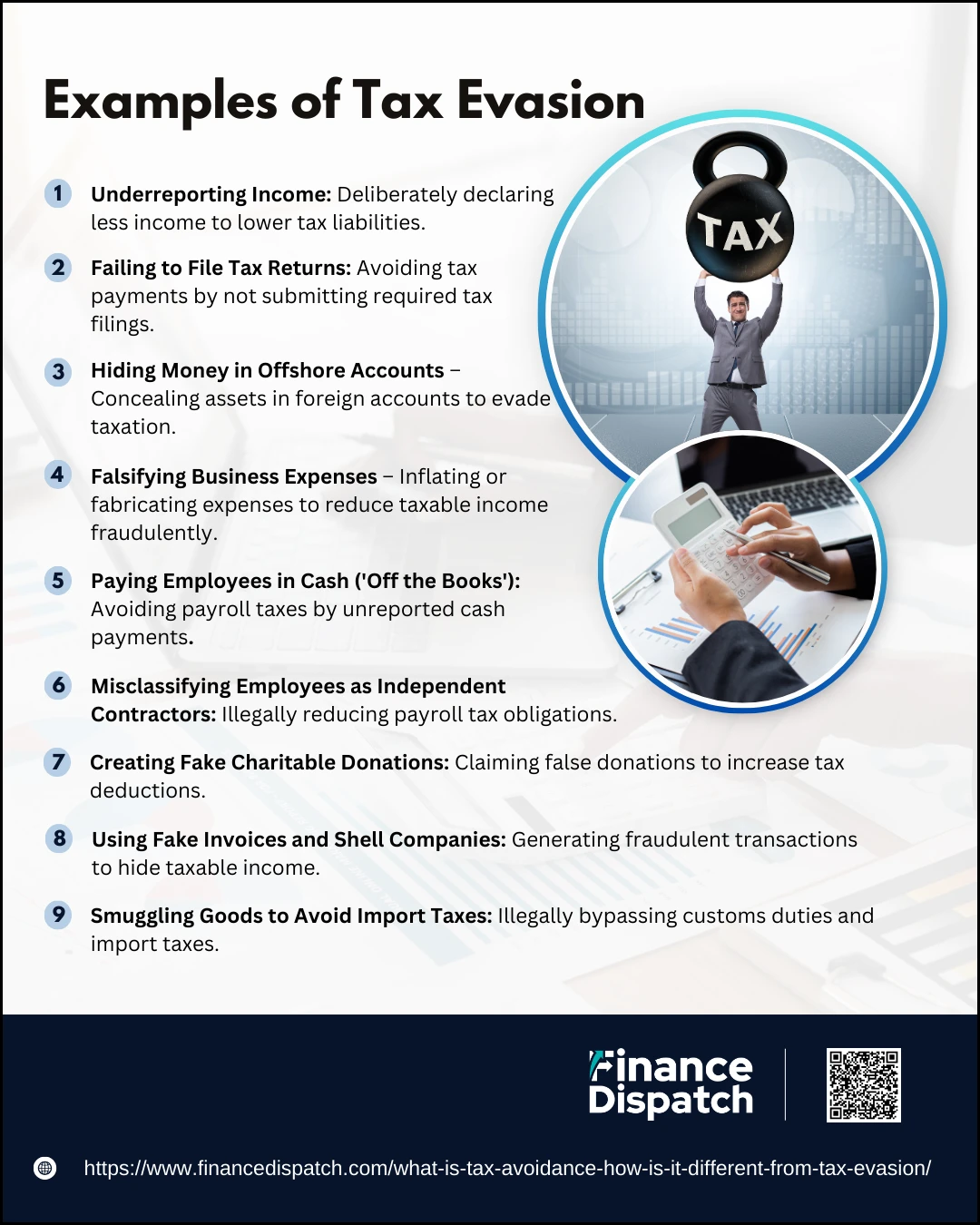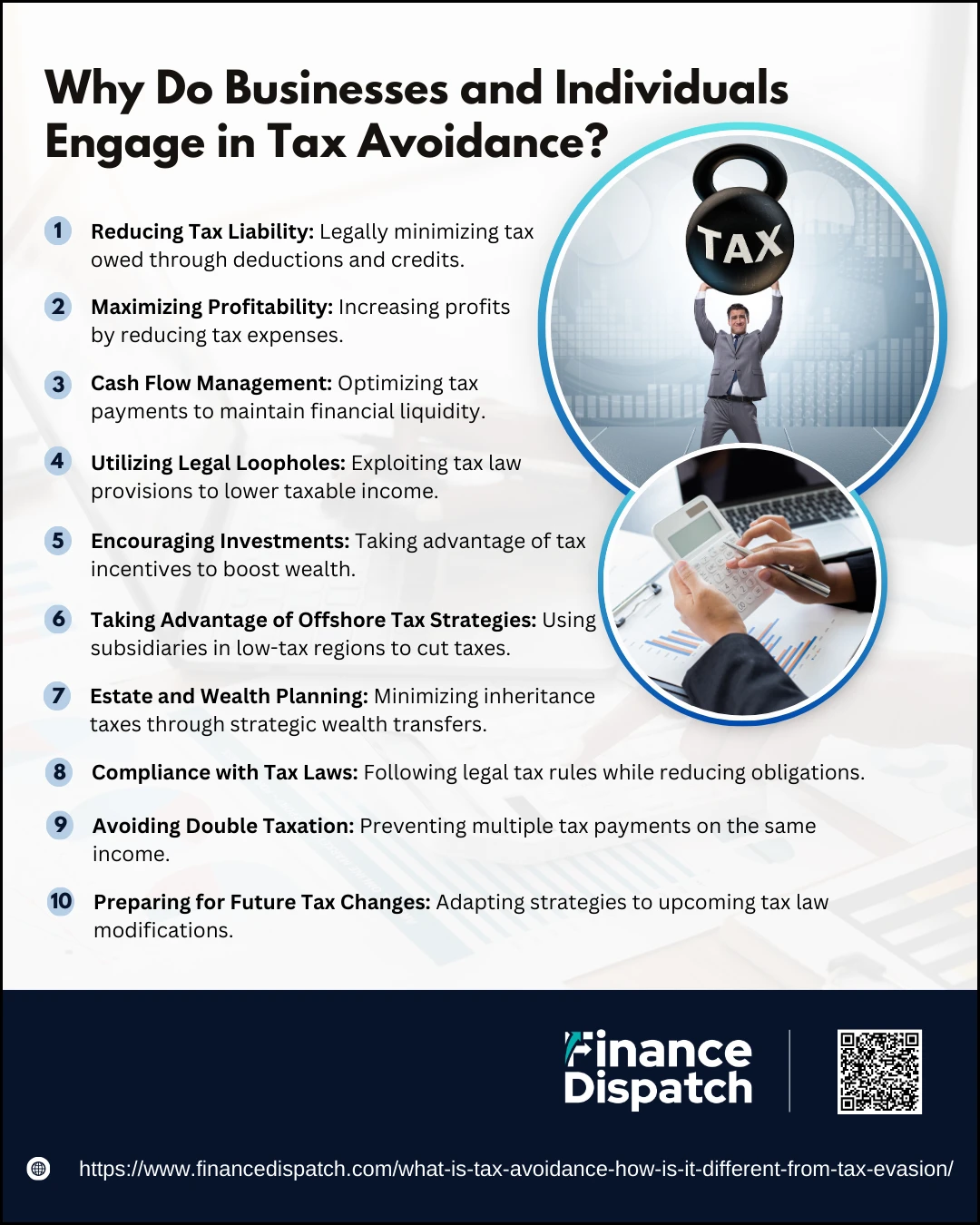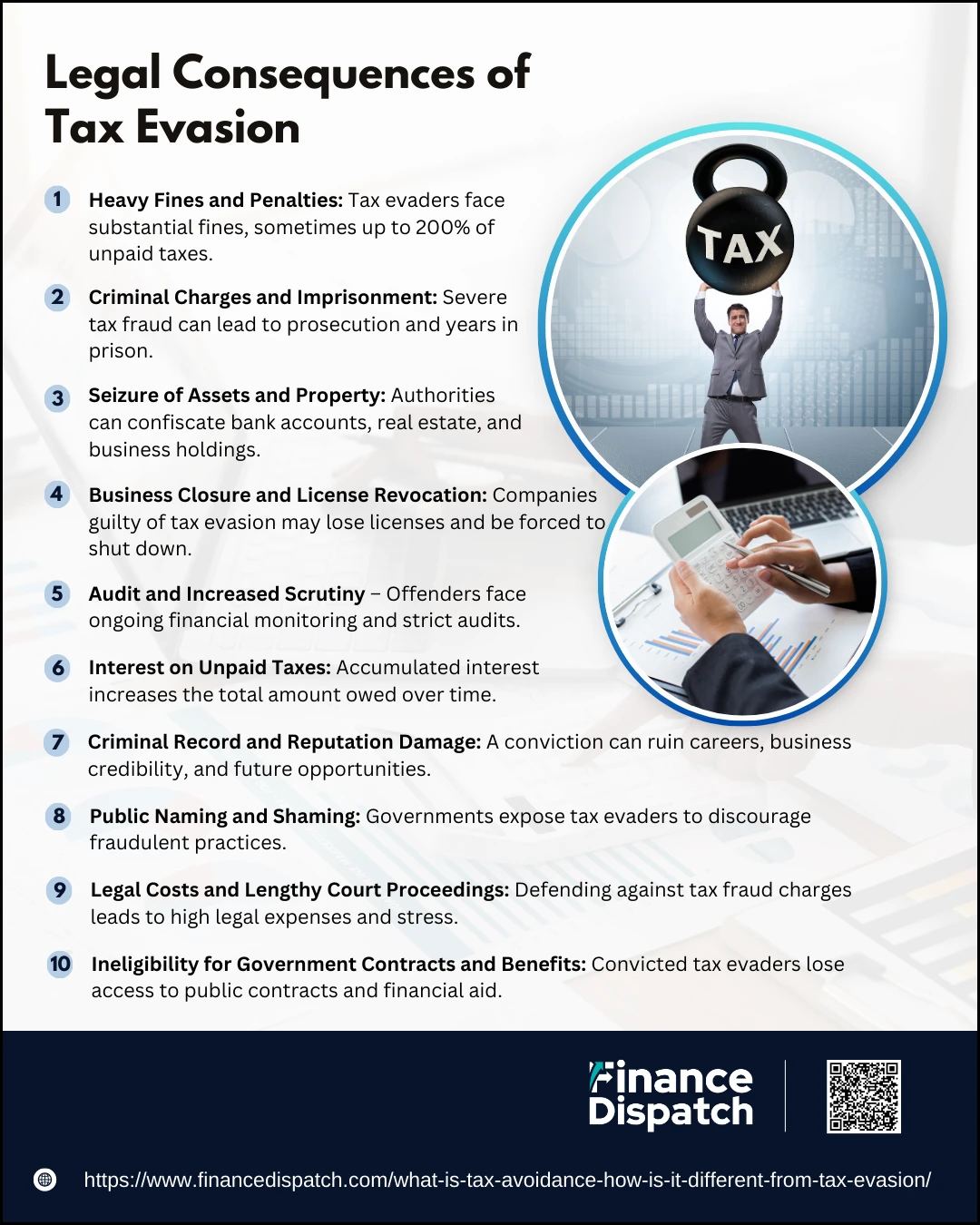Taxes play a crucial role in funding public services and infrastructure, yet many individuals and businesses seek ways to minimize their tax burden. While some methods are entirely legal, others cross the line into illegality. This is where the distinction between tax avoidance and tax evasion becomes important. Tax avoidance involves using legal strategies to reduce tax liability, such as claiming deductions and structuring finances efficiently. On the other hand, tax evasion refers to illegal activities, like underreporting income or hiding assets, to escape tax obligations. While both terms may seem similar, their legal and ethical implications are vastly different. In this article, we’ll explore what tax avoidance is, how it differs from tax evasion, and why understanding the fine line between the two is essential for businesses and individuals alike.
What is Tax Avoidance?
Tax avoidance is the practice of legally minimizing tax liabilities by utilizing provisions within the tax laws. It involves strategic financial planning to reduce the amount of tax owed, often by taking advantage of deductions, exemptions, credits, and investment incentives. For example, businesses may structure their operations to benefit from lower tax rates in specific jurisdictions, while individuals can claim tax-deductible expenses or invest in tax-advantaged accounts like retirement funds. Although tax avoidance is legal, it can sometimes be viewed as ethically questionable, especially when it involves aggressive strategies that exploit loopholes in the tax system. Governments around the world continuously update tax laws to close such loopholes and ensure that tax planning aligns with the intended spirit of the law.
 Examples of Tax Avoidance
Examples of Tax Avoidance
Tax avoidance involves legally minimizing tax liabilities by taking advantage of tax laws, deductions, and exemptions. While this practice is within the boundaries of the law, some strategies push ethical limits, leading to scrutiny by tax authorities. Individuals and corporations use various methods to reduce their taxable income and maximize financial benefits. Here are some of the most common tax avoidance strategies:
1. Investing in Tax-Free Bonds
Governments often issue municipal or tax-exempt bonds that allow investors to earn interest income without paying federal (and sometimes state) taxes. This makes them an attractive option for high-income individuals looking to lower their taxable income.
2. Contributing to Retirement Accounts:
Tax-deferred retirement plans, such as 401(k)s and IRAs, allow individuals to reduce taxable income by setting aside pre-tax earnings. Taxes are paid only upon withdrawal, often at a lower rate in retirement, effectively deferring taxation to a more favorable time.
3. Using Business Expense Deductions
Companies can legally reduce their taxable income by claiming deductions for operating costs such as rent, salaries, utilities, and travel expenses. These deductions help businesses reinvest in growth while lowering their tax burden.
4. Structuring Income as Capital Gains
Capital gains tax rates are often lower than income tax rates. Some individuals and businesses strategically structure earnings in ways that classify them as capital gains instead of ordinary income to take advantage of the lower tax rate.
5. Offshore Company Setup
Large multinational corporations sometimes establish subsidiaries in countries with lower tax rates, a practice known as corporate tax structuring. By routing profits through these jurisdictions, companies can significantly reduce the amount of tax they owe in high-tax countries.
6. Utilizing Tax Credits
Tax credits directly reduce the amount of tax owed rather than just lowering taxable income. Common tax credits include those for research and development, education, renewable energy investments, and hiring employees in economically disadvantaged areas.
7. Estate Planning and Gifting
Wealthy individuals can minimize inheritance taxes by strategically transferring wealth through trusts, gifts, and other estate planning mechanisms. This allows assets to be passed to heirs with reduced tax liabilities.
What is Tax Evasion?
Tax evasion is the illegal practice of deliberately avoiding paying taxes by misrepresenting financial information to tax authorities. Unlike tax avoidance, which operates within the legal framework, tax evasion involves fraudulent activities such as underreporting income, inflating deductions, hiding assets, or failing to file tax returns altogether. Businesses and individuals engage in tax evasion to reduce their tax liabilities, but doing so carries severe consequences, including hefty fines, legal penalties, and even imprisonment. Governments and tax authorities actively investigate and prosecute tax evasion cases to ensure compliance with tax laws and maintain the integrity of the tax system. While some individuals may engage in tax evasion unknowingly due to a lack of understanding of tax laws, intentional deception is considered a criminal offense with significant repercussions.
 Examples of Tax Evasion
Examples of Tax Evasion
Tax evasion occurs when individuals or businesses deliberately violate tax laws to reduce or eliminate their tax liability through fraudulent means. Unlike tax avoidance, which involves legal tax-saving strategies, tax evasion is illegal and can result in severe penalties, including hefty fines and imprisonment. Governments and tax authorities continuously monitor financial activities and conduct audits to identify cases of tax evasion. Many tax evasion practices involve concealing income, falsifying financial records, or engaging in fraudulent transactions. Below are some common examples of tax evasion:
1. Underreporting Income
A business owner or individual intentionally reports lower earnings than they actually received to reduce taxable income. For example, a restaurant that deals primarily in cash might fail to record cash transactions, thus hiding revenue from tax authorities.
2. Failing to File Tax Returns
Some individuals and businesses completely avoid filing tax returns, thinking they can escape taxation. However, tax authorities have systems in place to track income sources, and failure to file can result in severe financial penalties or even criminal charges.
3. Hiding Money in Offshore Accounts
Some wealthy individuals and corporations transfer money to bank accounts in tax havens to avoid taxation. While offshore banking itself is legal, failing to report foreign assets and income to tax authorities constitutes tax evasion.
4. Falsifying Business Expenses
Business owners sometimes exaggerate or create fake expenses to reduce taxable income. For example, claiming personal vacations as business trips or inflating office supply costs can fraudulently lower tax liabilities.
5. Paying Employees in Cash (‘Off the Books’)
Some employers pay workers in cash without reporting the payments to tax authorities. This allows them to avoid payroll taxes, while employees may also evade taxes by not declaring their income.
6. Misclassifying Employees as Independent Contractors
Businesses may classify full-time employees as independent contractors to avoid paying payroll taxes, employee benefits, and social security contributions. This illegal practice shifts the tax burden onto workers while reducing business costs.
7. Creating Fake Charitable Donations
Some individuals and companies claim false charitable contributions to fraudulently increase their tax deductions. This may involve fabricating donation receipts or inflating the amount donated to reduce taxable income.
8. Using Fake Invoices and Shell Companies
Businesses sometimes generate fake invoices or create shell companies to move money around and hide taxable income. These tactics create an illusion of higher expenses, reducing taxable profits illegally.
9. Smuggling Goods to Avoid Import Taxes
Import duties and taxes can be high, leading some businesses or individuals to illegally transport goods without declaring them to customs authorities. This is a common practice in black markets and illicit trade.
 Why Do Businesses and Individuals Engage in Tax Avoidance?
Why Do Businesses and Individuals Engage in Tax Avoidance?
Tax avoidance is a common financial strategy used by businesses and individuals to legally minimize their tax liabilities. While taxes fund essential public services such as healthcare, education, and infrastructure, taxpayers often seek ways to reduce their financial burden by utilizing deductions, credits, exemptions, and legal loopholes. Companies and individuals engage in tax avoidance to increase profitability, improve cash flow, and ensure compliance with tax laws while maximizing financial benefits. Although legal, aggressive tax avoidance strategies can raise ethical concerns and may lead to regulatory scrutiny. Below are the key reasons why businesses and individuals engage in tax avoidance:
1. Reducing Tax Liability
The primary motive for tax avoidance is to legally decrease the amount of tax owed. By leveraging deductions, exemptions, and tax credits, businesses and individuals can reduce their taxable income and retain more earnings.
2. Maximizing Profitability
Businesses aim to maximize profits, and minimizing tax payments is an effective way to increase financial efficiency. Lower tax obligations allow companies to reinvest in operations, expansion, or research and development.
3. Cash Flow Management
Effective tax planning helps businesses and individuals maintain better cash flow by deferring tax payments, optimizing tax deductions, or utilizing tax-advantaged investments. This ensures liquidity for future expenses or investments.
4. Utilizing Legal Loopholes
Tax laws contain provisions that offer opportunities for reducing tax liabilities. Skilled tax professionals help businesses and individuals identify and exploit legal loopholes to minimize taxable income without breaking the law.
5. Encouraging Investments
Many governments offer tax incentives for specific investments, such as retirement savings, real estate, or business development. Taxpayers take advantage of these incentives to grow their wealth while reducing their tax burden.
6. Taking Advantage of Offshore Tax Strategies
Large corporations often establish subsidiaries in low-tax jurisdictions to legally reduce their overall tax liability. This practice, known as tax structuring, helps companies remain competitive in global markets.
7. Estate and Wealth Planning
High-net-worth individuals use tax avoidance strategies to minimize estate taxes and pass on wealth to their heirs. Trusts, gifting, and other estate planning tools are common methods used to achieve this goal.
8. Compliance with Tax Laws
Businesses and individuals engage in tax avoidance to stay within legal boundaries while reducing tax payments. Proper tax planning ensures compliance with regulations while benefiting from available tax reliefs.
9. Avoiding Double Taxation
International businesses structure their operations to avoid being taxed multiple times on the same income. This is particularly relevant for multinational corporations operating in multiple tax jurisdictions.
10. Preparing for Future Tax Changes
Governments frequently revise tax policies, and businesses plan their tax strategies in anticipation of potential changes. Engaging in legal tax avoidance helps them stay ahead of regulatory adjustments and mitigate future tax liabilities.
Key Differences between Tax Avoidance and Tax Evasion
Although both tax avoidance and tax evasion aim to reduce tax liabilities, they are fundamentally different in terms of legality, ethical considerations, and consequences. Tax avoidance involves using legal strategies, such as deductions, exemptions, and credits, to minimize tax payments. It is a lawful and widely accepted practice, often encouraged through government incentives. Tax evasion, on the other hand, is an illegal activity where individuals or businesses deliberately conceal income, falsify records, or engage in fraudulent transactions to avoid paying taxes. Engaging in tax evasion can lead to severe penalties, including fines and imprisonment. Below is a detailed comparison highlighting the key differences between tax avoidance and tax evasion.
| Feature | Tax Avoidance | Tax Evasion |
| Legality | Legal | Illegal |
| Intent | Uses lawful means to minimize tax liabilities | Involves deceit, fraud, or misrepresentation to evade taxes |
| Methods Used | Taking advantage of deductions, credits, exemptions, and investment incentives | Underreporting income, falsifying documents, hiding assets, or failing to file tax returns |
| Ethical Considerations | Can be considered morally questionable if aggressive but remains legal | Universally unethical and considered a criminal offense |
| Transparency | Reported to tax authorities within legal frameworks | Concealed from tax authorities to avoid detection |
| Consequences | No legal penalties, but aggressive tax avoidance schemes may be challenged by tax authorities | Heavy fines, legal prosecution, and possible imprisonment |
| Examples | Claiming business expense deductions, investing in retirement plans, structuring income to minimize taxes | Hiding money in offshore accounts, creating fake expenses, underreporting income |
| Government Response | Governments may adjust tax laws to close loopholes | Authorities actively investigate and prosecute offenders |
 Legal Consequences of Tax Evasion
Legal Consequences of Tax Evasion
Tax evasion is a criminal offense that occurs when individuals or businesses intentionally misrepresent their financial information to avoid paying taxes. Unlike tax avoidance, which is a legal means of reducing tax liability, tax evasion involves deceitful practices such as underreporting income, inflating expenses, hiding assets, or failing to file tax returns. Since tax revenue is critical for funding public services like healthcare, education, and infrastructure, governments aggressively pursue tax evaders through audits, investigations, and legal actions. The penalties for tax evasion can be severe, ranging from monetary fines to imprisonment, asset forfeiture, and long-term reputational damage. Below are the most common legal consequences of tax evasion:
1. Heavy Fines and Penalties
Individuals and businesses caught engaging in tax evasion are often subjected to substantial fines. In many countries, tax authorities impose penalties of up to 200% of the unpaid tax amount. The fines increase based on the severity of the evasion, making it financially crippling for offenders.
2. Criminal Charges and Imprisonment
Tax evasion is classified as a criminal offense in most jurisdictions, with severe cases leading to prosecution. Depending on the amount evaded and the level of fraud involved, tax evaders can face jail sentences ranging from a few months to several years. For large-scale corporate fraud, prison terms can extend beyond a decade.
3. Seizure of Assets and Property
Governments have the legal authority to seize assets such as bank accounts, real estate, vehicles, and business holdings to recover unpaid taxes. In some cases, tax authorities may also freeze financial accounts and auction off properties to settle outstanding tax liabilities.
4. Business Closure and License Revocation
Companies found guilty of tax evasion may be forced to shut down their operations. Authorities can revoke business licenses, certifications, and permits, making it impossible for them to continue functioning legally. This is particularly damaging for financial institutions, professional service firms, and multinational corporations.
5. Audit and Increased Scrutiny
Once an individual or business is caught evading taxes, they are likely to face strict audits and financial scrutiny for years. Tax authorities closely monitor their future filings, financial transactions, and business dealings to prevent repeat offenses. This increased oversight can make it difficult to operate freely.
6. Interest on Unpaid Taxes
In addition to fines and penalties, tax evaders must pay interest on their unpaid taxes. The longer the taxes remain unpaid, the higher the interest accumulates, making the total amount owed significantly larger than the original tax liability.
7. Criminal Record and Reputation Damage
A conviction for tax evasion results in a permanent criminal record, which can have devastating long-term consequences. Individuals may find it challenging to secure employment, obtain business loans, or even travel to certain countries due to legal restrictions. For businesses, a tarnished reputation can lead to loss of clients, investors, and partnerships.
8. Public Naming and Shaming
Many governments publish the names of convicted tax evaders to deter others from committing similar offenses. This public disclosure can severely damage the credibility of individuals, companies, and even public figures, leading to loss of trust and professional relationships.
9. Legal Costs and Lengthy Court Proceedings
Fighting tax evasion charges often requires hiring tax attorneys, forensic accountants, and legal advisors, leading to significant legal expenses. The court process can be lengthy and stressful, further adding to financial burdens. In many cases, the cost of litigation can exceed the amount of unpaid taxes.
10. Ineligibility for Government Contracts and Benefits
Convicted tax evaders may lose their eligibility for government contracts, tax credits, subsidies, and financial aid programs. Businesses that rely on public sector contracts may find it difficult to recover, as many governments blacklist companies involved in tax fraud.
Famous Cases of Tax Avoidance and Evasion
Tax avoidance and tax evasion have been widely debated topics, with numerous high-profile individuals and corporations making headlines for their involvement in questionable tax practices. While tax avoidance uses legal strategies to minimize tax liability, tax evasion involves illegal methods such as underreporting income or hiding assets to escape taxation. Governments worldwide have cracked down on both practices, imposing hefty fines and legal consequences on those who cross the line. Below are some of the most famous cases of tax avoidance and evasion:
Tax Avoidance Cases (Legal but Controversial)
- Apple Inc. – Used offshore subsidiaries in Ireland to reduce its tax burden, leading to a major EU investigation and an order to pay €13 billion in back taxes.
- Amazon – Structured its business across multiple jurisdictions to minimize taxes, sparking criticism over its low effective tax rate.
- Google (Alphabet Inc.) – Utilized tax loopholes such as the “Double Irish” and “Dutch Sandwich” strategies to avoid billions in corporate taxes.
- Starbucks – Paid minimal corporate tax in the UK despite generating massive revenue, by shifting profits to lower-tax jurisdictions.
- Nike – Established subsidiaries in the Netherlands to reduce tax payments, taking advantage of lenient tax laws.
Tax Evasion Cases (Illegal and Punishable)
- Al Capone (1931) – The infamous gangster was convicted of tax evasion after failing to report his illegal income, leading to an 11-year prison sentence.
- Leona Helmsley (1989) – The hotel mogul was convicted for evading $1.2 million in taxes by illegally billing personal expenses to her business.
- Walter Anderson (2006) – A telecommunications entrepreneur convicted of the largest tax evasion case in U.S. history, hiding $365 million in offshore accounts.
- Paul Manafort (2018) – Former political consultant sentenced for tax and bank fraud after failing to report millions in foreign income.
- HSBC Swiss Banking Scandal (2015) – HSBC’s Swiss branch helped wealthy clients evade taxes by concealing undeclared accounts worth billions.
Ethical Considerations of Tax Avoidance and Evasion
While tax avoidance is legal and tax evasion is illegal, both raise significant ethical concerns. Tax avoidance, though within the law, often involves exploiting loopholes that allow individuals and corporations to pay less tax than what may be considered fair. This practice can lead to public criticism, as it shifts the tax burden onto ordinary taxpayers and reduces government revenue for essential services like healthcare, education, and infrastructure. Large multinational corporations and wealthy individuals using complex financial structures to minimize taxes may be perceived as undermining social responsibility. On the other hand, tax evasion is not just unethical but outright illegal, involving deliberate deceit such as hiding income or falsifying records to avoid taxes. It weakens public trust, contributes to economic inequality, and can lead to severe legal consequences. Ethical tax compliance goes beyond legality—it involves contributing a fair share to society and ensuring that tax systems remain equitable and sustainable for all.
How Governments Tackle Tax Avoidance and Evasion
Governments worldwide implement various measures to combat tax avoidance and evasion to ensure fair taxation and maintain public revenue. Tax evasion, being illegal, is addressed through strict enforcement, including audits, financial investigations, and severe penalties such as fines and imprisonment. Authorities use advanced data analytics, whistleblower programs, and international cooperation agreements like the Common Reporting Standard (CRS) to detect hidden assets and unreported income. Tax avoidance, while legal, is often tackled by closing loopholes through legislative reforms, such as limiting aggressive tax planning schemes and introducing anti-avoidance laws like the General Anti-Avoidance Rule (GAAR). Countries also collaborate through global initiatives like the OECD’s Base Erosion and Profit Shifting (BEPS) project to prevent corporations from shifting profits to low-tax jurisdictions. Additionally, naming and shaming large tax avoiders and increasing transparency through mandatory reporting requirements discourage unethical tax practices. By continuously updating tax policies and strengthening enforcement, governments aim to create a fairer and more effective tax system.
Impact of Tax Avoidance and Evasion on the Economy
Tax avoidance and tax evasion both have significant economic consequences, affecting government revenue, public services, and economic equality. Tax avoidance, while legal, reduces the funds available for essential services such as healthcare, education, and infrastructure, placing a heavier tax burden on individuals and smaller businesses that cannot access complex tax-saving strategies. Large corporations shifting profits to low-tax jurisdictions also create an uneven playing field, making it harder for smaller competitors to thrive. Tax evasion, being illegal, further worsens the situation by directly depriving governments of tax revenue, leading to budget deficits, reduced social programs, and increased borrowing. When tax evasion becomes widespread, it undermines trust in the tax system, encouraging more non-compliance and creating a cycle of financial instability. Governments must continuously strengthen enforcement and close loopholes to ensure a fair tax system that promotes economic stability and equitable growth.
Conclusion
Tax avoidance and tax evasion have significant implications for individuals, businesses, and economies worldwide. While tax avoidance remains legal, aggressive strategies that exploit loopholes can raise ethical concerns and lead to stricter regulations. On the other hand, tax evasion is a criminal offense that carries severe penalties, including fines, asset seizures, and imprisonment. Both practices can reduce government revenue, weaken public trust in the tax system, and contribute to economic inequality. To maintain financial stability and fairness, governments continue to strengthen enforcement, close tax loopholes, and promote transparency in taxation. Ethical tax compliance is not just a legal obligation but a societal responsibility, ensuring that all individuals and businesses contribute fairly to economic development and public welfare.



